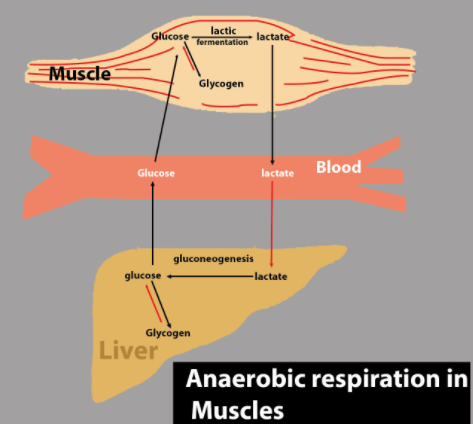
Which of the following is the byproduct of anaerobic respiration in muscles?
(A)Sugar
(B)Lactic acid
(C)HCl
(D)Oxygen
Answer
578.7k+ views
Hint: The byproduct of anaerobic respiration in muscles is an organic acid that is white in solid-state and has a molar mass of 90g/mol. When this bi-product is released, it becomes harder to exercise more.
Complete answer:
the byproduct of anaerobic respiration in muscles is Lactic acid. During anaerobic respiration, your muscle cells use sugar to form ATP, but they do not use oxygen. This process produces lactate, which in a very short time gets converted to lactic acid, which makes your muscles burn. lactic acid, as you'll have experienced, makes it harder to exercise.
Additional Information: Most organisms need oxygen for respiration but in some organisms and even in some tissues can still respire if the oxygen runs out. In conditions when there is low or no oxygen, the method of anaerobic respiration occurs. The 'an' in 'anaerobic' means without. In anaerobic respiration, during the oxidation of glucose not all of the energy will be released from the glucose molecule because it is just partially broken down. This means the oxidation of glucose is incomplete. This is the reason, the reaction releases much less energy than aerobic respiration - This implies that fewer molecules of ATP are often made.
So, the correct answer is ‘Lactic acid’.
Note: The lactic acid production depends mainly on two different factors which are cellular ph and temperature. Lactic acid produced during anaerobic respiration lowers the cellular pH and a lower pH means it will be harder to make ATP, which is needed for muscle contraction. When our muscles are cold, they have a much harder time contracting and the lactic acid is present in larger amounts.

Complete answer:
the byproduct of anaerobic respiration in muscles is Lactic acid. During anaerobic respiration, your muscle cells use sugar to form ATP, but they do not use oxygen. This process produces lactate, which in a very short time gets converted to lactic acid, which makes your muscles burn. lactic acid, as you'll have experienced, makes it harder to exercise.
Additional Information: Most organisms need oxygen for respiration but in some organisms and even in some tissues can still respire if the oxygen runs out. In conditions when there is low or no oxygen, the method of anaerobic respiration occurs. The 'an' in 'anaerobic' means without. In anaerobic respiration, during the oxidation of glucose not all of the energy will be released from the glucose molecule because it is just partially broken down. This means the oxidation of glucose is incomplete. This is the reason, the reaction releases much less energy than aerobic respiration - This implies that fewer molecules of ATP are often made.
So, the correct answer is ‘Lactic acid’.
Note: The lactic acid production depends mainly on two different factors which are cellular ph and temperature. Lactic acid produced during anaerobic respiration lowers the cellular pH and a lower pH means it will be harder to make ATP, which is needed for muscle contraction. When our muscles are cold, they have a much harder time contracting and the lactic acid is present in larger amounts.

Recently Updated Pages
Master Class 11 Computer Science: Engaging Questions & Answers for Success

Master Class 11 Business Studies: Engaging Questions & Answers for Success

Master Class 11 Economics: Engaging Questions & Answers for Success

Master Class 11 English: Engaging Questions & Answers for Success

Master Class 11 Maths: Engaging Questions & Answers for Success

Master Class 11 Biology: Engaging Questions & Answers for Success

Trending doubts
One Metric ton is equal to kg A 10000 B 1000 C 100 class 11 physics CBSE

There are 720 permutations of the digits 1 2 3 4 5 class 11 maths CBSE

Discuss the various forms of bacteria class 11 biology CBSE

Draw a diagram of a plant cell and label at least eight class 11 biology CBSE

State the laws of reflection of light

10 examples of friction in our daily life




